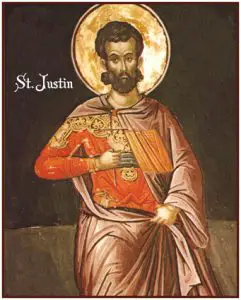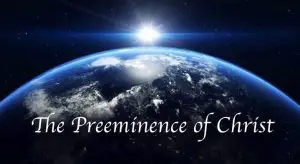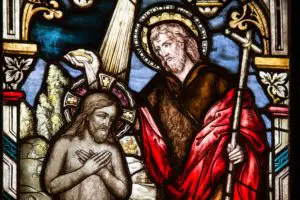One of the few passages that is used to support the notion that Jesus is the Creator or Co-Creator of the world is found in Paul’s letter to the Colossians:
Colossians 1:15-18 (NASB) He [Jesus] is the image of the invisible God, the firstborn of all creation. 16 For by Him [Jesus] all things were created, both in the heavens and on earth, visible and invisible, whether thrones or dominions or rulers or authorities—all things have been created through Him and for Him. 17 He is before all things, and in Him all things hold together. 18 He is also head of the body, the church; and He is the beginning, the firstborn from the dead, so that He Himself will come to have first place in everything.
How would Paul’s audience and others living in the first century have understood this passage? Did they believe Jesus was the Creator in Genesis? In order to arrive at a sound answer, we’ll need to explore the context of this passage, as well as Paul’s Christology.
Who did Paul believe the Creator to be?

In Paul’s opening remarks to the Colossians, he identifies God as the Father, while Jesus is Lord and the Christ, that is, the one anointed by God:
Colossians 1:1-3 (NASB) Paul, an apostle of Jesus Christ by the will of God, and Timothy our brother, 2 To the saints and faithful brethren in Christ who are at Colossae: Grace to you and peace from God our Father. 3 We give thanks to God, the Father of our Lord Jesus Christ, praying always for you, (emphasis added)
Moreover, in his letter to the Corinthians, Paul unmistakably identifies God the Father as the one God, while Jesus is again designated as Lord and Christ:
1 Corinthians 8:6 (NASB) yet for us there is but one God, the Father, from whom are all things and we exist for Him; and one Lord, Jesus Christ, by whom are all things, and we exist through Him. (emphasis added)
When Paul addressed those gathered on Mars Hill in Athens, he taught that it was God who made the world and all things in it:
Acts 17:24-25, 30-31 (NASB) 24 “The God who made the world and all things in it, since He is Lord of heaven and earth, does not dwell in temples made with hands; 25 nor is He served by human hands, as though He needed anything, since He Himself gives to all people life and breath and all things…30 “Therefore having overlooked the times of ignorance, God is now declaring to men that all people everywhere should repent, 31 because He has fixed a day in which He will judge the world in righteousness through a Man whom He has appointed, having furnished proof to all men by raising Him from the dead.”
Notice that Paul differentiates between God, who made the world, and Jesus. God is the Creator, whereas, Jesus is the man whom God resurrected and appointed as judge. From this point forward in our examination, whatever Paul says to the church in Colossae must not contradict what he has, under the inspiration of the Spirit of God, written elsewhere.
Context
In chapter one, Paul writes concerning the redemption of man and the coming of the kingdom:
Colossians 1:12-14 (NASB) giving thanks to the Father, who has qualified us to share in the inheritance of the saints in Light. 13 For He rescued us from the domain of darkness, and transferred us to the kingdom of His beloved Son, 14 in whom we have redemption, the forgiveness of sins. (emphasis added)
Paul credits God the Father with qualifying, rescuing, and transferring believers into the kingdom, which according to Scripture, he has given to Jesus.[1] For this reason, the apostle gives thanks to the Father alone without including the Son or the Spirit. In fact, six times in this letter, Paul speaks of giving thanks, and it is always to God, who is the Father.
Now Paul’s emphasis turns to discussing the pre-eminence or supremacy of the king in the coming kingdom. He does so by using such words as firstborn, before, head, the beginning and first place:
Colossians 1:15-18 (NASB) He [Jesus] is the image of the invisible God, the firstborn of all creation. 16 For by Him all things were created, both in the heavens and on earth, visible and invisible, whether thrones or dominions or rulers or authorities—all things have been created through Him and for Him. 17 He is before all things, and in Him all things hold together. 18 He is also head of the body, the church; and He is the beginning, the firstborn from the dead, so that He Himself will come to have first place in everything. (emphasis added)
Jesus is the image of God
In verse 15, Paul writes that Jesus is the image of the invisible God. Some interpret this to mean that Jesus is himself, God, and for this reason, Jesus is pre-eminent. While this verse is covered in greater detail here, a brief explanation is warranted. The word image in the Greek is eikôn, and it means image, i.e., literally a statue, or figuratively, a representation.[2] Thus, Jesus is not God, rather he is the image of God. As God’s agent (Christ or Messiah) he imaged or represented God to the world by speaking only God’s words,[3] performing only God’s acts,[4] and submitting to God’s will instead of his own. Bearing the image of someone does not mean you are that person. For example, Paul wrote that believers have been predestined to be conformed to the image (eikôn) of God’s Son.[5] Surely, we would all agree that bearing Christ’s image doesn’t mean we are Christ. Therefore, just as we are to emulate Jesus in all that we are and do, in like manner, Jesus imaged or emulated who God is by the life he led.
Firstborn of all Creation

Paul emphasizes Jesus’ supremacy by stating that he is the firstborn:
Colossians 1:15 (NASB) He [Jesus] is the image of the invisible God, the firstborn of all creation. (emphasis added)
What does it mean to be the firstborn of all creation? Some of the early Church Fathers, such as Justin Martyr[6] (2nd century) and Arius (4th century), believed that God created Jesus first, and then either created the world through Jesus. Alternatively, some believed that God created Jesus, and then the “firstborn” created the world directly. But is this what Paul meant by the phrase? Thankfully, Paul offers clarity in verse 18:
Colossians 1:18 (NASB) He is also head of the body, the church; and He is the beginning, the firstborn from the dead, so that He Himself will come to have first place in everything. (emphasis added)
When Paul uses the phrase “firstborn,” he is referring to the fact that Jesus was the first man raised from the dead and given immortality. For example, he uses a similar phrase in his letter to the Corinthians:
1 Corinthians 15:20 (NASB) But now Christ has been raised from the dead, the first fruits of those who are asleep.[7] (emphasis added)
Paul is emphasizing that Jesus is the firstborn or the first fruits of this new, immortal creation. Paul is not referring to the Genesis creation, but to the coming new creation, that is, the kingdom of God.
Prepositions: Small but mighty words!
What role did the firstborn from the dead play in the new creation? To find out, we’ll need to examine two prepositions. Typically prepositions are thought to be minor, insignificant words, but as we’ll discover, they can change the meaning of a passage:
Colossians 1:16 (NASB) For by Him all things were created, both in the heavens and on earth, visible and invisible, whether thrones or dominions or rulers or authorities—all things have been created through Him and for Him. (emphasis added)
The word by in the Greek is en. It is a preposition that is most often translated in, on, among, but also as with or by. The word through in Greek is dia and it means through, on account of, because of. The word Him in the Greek is auto, and it is used for second and third person pronouns such as he, she, they, them, etc.
 To translate the phrase en auto as “by Him all things were created” gives the impression that Jesus is the Creator seen in Genesis 1. But this would contradict the rest of Scripture and Paul’s theology in particular, which, as we have already seen, states that God the Father is Creator. We know that it is reasonable to translate en as “in” because translators did just that in verse 16 when they rendered en to read in the heavens and not by the heavens. Furthermore, mainstream translations such as the New American Standard Bible, the Amplified Bible and the English Standard Version all note in their translations that by Him (en auto) can also be translated as in Him. Moreover, the New International Version, the Orthodox Jewish Bible, Young’s Literal Bible, and several others[8] actually translate the phrase to say just that: “For in Him all things were created” thus, removing the impression that Jesus was the Creator in Genesis.
To translate the phrase en auto as “by Him all things were created” gives the impression that Jesus is the Creator seen in Genesis 1. But this would contradict the rest of Scripture and Paul’s theology in particular, which, as we have already seen, states that God the Father is Creator. We know that it is reasonable to translate en as “in” because translators did just that in verse 16 when they rendered en to read in the heavens and not by the heavens. Furthermore, mainstream translations such as the New American Standard Bible, the Amplified Bible and the English Standard Version all note in their translations that by Him (en auto) can also be translated as in Him. Moreover, the New International Version, the Orthodox Jewish Bible, Young’s Literal Bible, and several others[8] actually translate the phrase to say just that: “For in Him all things were created” thus, removing the impression that Jesus was the Creator in Genesis.
Biblical scholars attest that en auto here is better translated in him all things were created. For example, The Expositors Greek Testament states that en auto here “does not mean by him.”[9] A Grammar of New Testament Greek offers, “We must render en ‘because of'” in lieu of by Him. In other words, because of Him, all things were created.[10] Moreover, Sir Anthony Buzzard in his translation explains his take on the matter:
I take en here as causal, i.e. because of him, for his sake, with him in view, with him in intention [all things were created].[11] (emphasis added)
Professor and author, James Dunn agrees that the phrase all things were created means created with Jesus “in intention,”[12] which is to say with him in mind. Thus, according to these scholars and Bible translators, Colossians 1:16 is better translated as:
- because of Him all things were created
- all things were created with Jesus in mind (or in view)
- all things were created…with Jesus in intention
- all things were created for Jesus’ sake
Why would some translators choose to translate this verse as “by Him” all things were created? It’s possible because it gives the English reader the impression that Jesus is the Creator, thus adding weight to the belief that Jesus pre-existed as God.
Similar to the way that en auto is better rendered because of Jesus or with Jesus in mind, the last phrase of verse 16, “all things have been created through Him (dia auto), can also be translated as “all things have been created on account of or because of him.” As mentioned earlier, the word through here in the Greek is dia, and it can be translated as through, on account of, because of.[13] Thus, another way to render Colossians 1:16 that is more in keeping with various Bible translations and scholars is as follows:
Colossians 1:16 [Because of Jesus, on account of Jesus, or with Jesus in mind] all things were created, both in the heavens and on earth, visible and invisible, whether thrones or dominions or rulers or authorities—all things have been created [on account of Him or because of Him] and for Him.
As we continue with our examination, we’ll see that the context confirms this is the more appropriate translation. Furthermore, it better fits with Paul’s theology and the rest of Scripture which reveals that God the Father alone created the world.[14]
Encircling
We gain additional insight into Paul’s meaning of the passage under review when we understand that he employs a literary device known as encircling, or what the Greeks called epanadiplosis.[15] The phrases “all things were created” and “all things have been created” serve to encircle the words or phrases in between. Noted theologian  E.W. Bullinger, in his book, Figures of Speech Used in the Bible, explains it this way:
E.W. Bullinger, in his book, Figures of Speech Used in the Bible, explains it this way:
Whenever this figure [encircling] is used, it marks what is said as being completed in one complete circle…giving completeness of the statement that is made.[16]
It may help to think of Paul’s encircling phrases as bookends that mark the beginning and the end of what is being expressed. They serve to emphasize what Paul is including in the category he’s labeled as all things:
Colossians 1:16 (NASB) For by Him (on account of Him) all things were created, both in the heavens and on earth, visible and invisible, whether thrones or dominions or rulers or authorities—all things have been created through Him [on account of Him or because of Him] and for Him.
What has Paul designated as all things?
According to Paul, all things is described as: thrones, dominions, rulers, authorities, whether in heaven or on earth, visible or invisible. Notice there is no mention of any element of the Genesis creation. Paul does not speak of the sun, moon, or stars. Nor does he mention plant life, animals or humans. Thus, Paul is not referring to the creation of this world. Rather, the all things Paul enumerates have to do with the governance of the coming kingdom. You’ll recall that Paul’s purpose in this passage, according to the context, is to demonstrate Jesus’ pre-eminence in the kingdom.[17]
Some claim Paul’s use of the word all here in verse 16 proves the Genesis Creation is what he had in mind. However, the word all can be used in a limited sense. For example, in Colossians 1:5-6 Paul writes that the gospel which has come to the Colossians just as it has in all the world, is constantly bearing fruit and increasing. But had the gospel really gone into all the world? Had it been preached in America? Australia? Antarctica? No, of course, not. The word all here is used in a limited sense to mean all of the Roman empire. Thus, in verse 16, all things is limited to those things included in Paul’s list.
Thrones, Dominions, Rulers and Authorities
What exactly is Paul referring to when he speaks of the governance of the coming kingdom in terms of thrones, dominions, rulers, and authorities? The vast majority of commentaries say it’s impossible to know exactly what Paul had in mind here and how these terms might differ from one another. What we do know, however, is that similar language is used in the Bible to describe both earthly and angelic or celestial governance.[18] Scholars agree that these terms seem to indicate some kind of hierarchy, just as we have local, state, and federal levels of authority. Regardless of the particulars of these levels of government in the future kingdom, Paul’s point is that Christ is above all levels of government, both human and angelic.
Jesus is before all things
In verse 17, we see another phrase which some point to as proof that Jesus is the God of Creation:
Colossians 1:17-18 (NASB) He is before all things, and in Him all things hold together.
 What does it mean that Jesus is before all things? Some see this as a reference to a heavenly pre-existence, but we must remember, “all things” in this context refers to the coming kingdom and Jesus’ pre-eminence in that kingdom. Furthermore, the word before in the Greek is pro and it can mean before in time, place or position, and rank. Each of these definitions can be applied to the text without including the notion of a literal pre-existence. For example, as king, Jesus is chronologically the first one “born” into the immortal kingdom. In addition, Jesus is before or positionally in front of those whom He leads. With regard to rank, Jesus is superior to all since he is seated at the right hand of God and has been granted the highest level of authority in the kingdom.[19]
What does it mean that Jesus is before all things? Some see this as a reference to a heavenly pre-existence, but we must remember, “all things” in this context refers to the coming kingdom and Jesus’ pre-eminence in that kingdom. Furthermore, the word before in the Greek is pro and it can mean before in time, place or position, and rank. Each of these definitions can be applied to the text without including the notion of a literal pre-existence. For example, as king, Jesus is chronologically the first one “born” into the immortal kingdom. In addition, Jesus is before or positionally in front of those whom He leads. With regard to rank, Jesus is superior to all since he is seated at the right hand of God and has been granted the highest level of authority in the kingdom.[19]
Why is Jesus pre-eminent in the kingdom?
We must pause a moment and ask, Why is Jesus pre-eminent? Is it because he is God and, as such, inherently ranks above all? Not according to Scripture. Jesus occupies the highest position because God exalted him to a place of power and authority:
Ephesians 1:19-21 (NASB) and what is the surpassing greatness of His [God’s] power toward us who believe. These are in accordance with the working of the strength of His [God’s] might 20 which He brought about in Christ, when He [God] raised Him from the dead and seated Him at His right hand in the heavenly places, 21 far above all rule and authority and power and dominion, and every name that is named, not only in this age but also in the one to come. (emphasis added)
Paul’s teaching in Ephesians parallels that of his teaching in Colossians and Philippians,[20] which states that Jesus’ position or rank was delegated to Him by God the Father. The apostle Peter also speaks of this:
1 Peter 3:22 (NASB) [Jesus Christ], who is at the right hand of God, having gone into heaven, after angels and authorities and powers had been subjected to Him. (emphasis added)
After God raised Jesus from the dead, He made him superior to all governing authorities. In other words, before this time, they weren’t subjected to him. If Jesus is God, this makes absolutely no sense. But if he is the exalted human agent, it makes perfect sense,[21] and it is in keeping with Scripture which says that God gave Jesus authority to rule:
Matthew 11:27 (NASB) “All things have been handed over to Me by My Father...” (emphasis added)
Matthew 28:18 (NASB) And Jesus came up and spoke to them, saying, “All authority has been given to Me in heaven and on earth. (emphasis added)
John 3:35 (NASB) “The Father loves the Son and has given all things into His hand. (emphasis added)
Jesus holds all things together
But what about the fact that Jesus is said to hold all things together? Doesn’t this indicate he is deity?
Colossians 1:17 (NASB) He is before all things, and in Him all things hold together. (emphasis added)
 Some believers reason that only God could hold the universe together, therefore, Jesus must be God. Bestselling Christian author, Max Lucado, who believes Jesus is God, wrote about how he imagined Jesus and the universe related to one another when Jesus was an infant:
Some believers reason that only God could hold the universe together, therefore, Jesus must be God. Bestselling Christian author, Max Lucado, who believes Jesus is God, wrote about how he imagined Jesus and the universe related to one another when Jesus was an infant:
Angels watched as Mary changed God’s diaper. The universe watched with wonder as The Almighty learned to walk.”[22]
Of course, this creates quite the conundrum. First, Jesus is never referred to as “the Almighty” in Scripture.[23] Second, if Jesus is said to be the one who holds the universe together, how did he manage to accomplish this when he was developmentally unable to do the simplest of tasks such as walking? How can you hold all things together if you need someone to change your diaper? Surely, there is a more reasonable explanation.
What are the “all things” that Jesus holds together?
Again, according to the context, all things refers to the governance of the coming kingdom, not the universe or Creation. Jesus holds the kingdom together because God has given him the power and the authority to do so. That is to say, the coming kingdom coalesces with the exalted Jesus as its head.
Not only is the governance of the kingdom under Jesus’ delegated authority, so is the Church:
Colossians 1:18 (NASB) He is also head of the body, the church; and He is the beginning, the firstborn from the dead, so that He Himself will come to have first place in everything. (emphasis added)
By virtue of his death and resurrection, Jesus is not only pre-eminent in the coming kingdom, he is also the head of the Church and the first to be raised to immortality. Thus, he will come to have first place in everything both on earth and in heaven.
Conclusion
God created the structure of the kingdom, its governance and hierarchy, with the king in mind. Paul was not teaching the church in Colossae that Jesus is God or that he is the Creator or even the Co-Creator. Rather, Paul was emphasizing that Jesus is the one chosen by God to rule and reign in the coming kingdom, having been exalted to God’s right hand, he now occupies first place in everything.
[1] God has given Jesus the kingdom, appointing him as ruler under His authority: Daniel 7:13-14; Matthew 21:33-40; 28:18; 1 Corinthians 15:23-28; Ephesians 1:19-23; Philippians 2:9-11.
[2] NASB Greek-Hebrew Dictionary
[3] John 7:16-17; 8:28; 12:49; 14:10, 24.
[4] Acts 2:22; 10:38; John 3:2; 5:19; 14:10; 17:4, etc.
[5] Romans 8:29; 2 Corinthians 3:18; Philippians 3:21, etc.
[6] Justin Martyr is technically considered one of the Apostolic Fathers, a term that refers to someone who lived in the late first or second centuries and who is thought to have known one of the twelve apostles or was strongly influenced by them. They do not carry the same weight or authority as the twelve apostles.
[7] The term “asleep” is used in Scripture as a euphemism for death.
[8] Berean Study Bible, Berean Literal Bible, ASV, Douay-Rheims, ERV, Weymouth, Wycliffe, etc.
[9] The Expositor’s Greek Testament, Vol. 3, W. Robertson Nicoll, ed., (London: Hodder and Stoughton, 1903), p. 504.
[10] A Grammar of New Testament Greek: Syntax, Vol. 3, Nigel Turner, (T & T Clark, 1963), p. 253.
[11] Sir Anthony Buzzard, The One God, the Father, One Man Messiah Translation, (McDonough, GA: Restoration Fellowship, 2014), p. 497.
[12] James D.G. Dunn, Christology in the Making: A New Testament Inquiry into the Origins of the Doctrine of the Incarnation, (Grand Rapids: Wm. B. Eerdmans Publishing Co., 1989) p. 190.
[13] Strong’s Exhaustive Concordance, #1223 dia
[14] Isaiah 44:24.
[15] BiblicalUnitarian.com, Colossians 1:15-20, accessed 10-20-19. https://www.biblicalunitarian.com
[16] E.W. Bullinger, Figures of Speech Used in the Bible, (1898), p. 245.
[17] Colossians 1:13ff.
[18] Earthly: Luke 12:11, 20:20; 1 Corinthians 15:24; Titus 3:1. Heavenly: Romans 8:38; 1 Peter 3:22; Ephesians 3:10, 6:12.
[19] 1 Corinthians 15:23-28.
[20] Philippians 2:5-11.
[21] Hebrews 2:9; Acts 2:26; Colossians 2:15; Philippians 2:5-11.
[22] Max Lucado, Just a Moment, accessed 10-18-19, https://maxlucado.com/just-a-moment/
[23] “Almighty” appears 58 times in the Bible as a reference to God. Revelation 21:22 distinguishes between God, who is the Almighty and Jesus, who is the Lamb. Despite some translations’ use of “red letters,” Revelation 1:8 is not a reference to Jesus because only God is called “the Lord God” or “the Lord God Almighty” in each of the 134 times it appears in Scripture.




Thanks for this – a wonderful post.
Is this same logic applicable to 1 Cor 8:6 (last part)
… and one Lord, Jesus Christ, _**through whom**_ are all things and _**through whom**_ we exist.
where _**through whom**_ should be understood as: “on account of or because of.”
If you are able, it would be wonderful if you could do a post on this (Second half of 1 Cor 8:6). Most Biblical Unitarian articles I have found on 1 Cor 8:6 focus on the fact this verse makes a clear distinction between the “one God, the Father” and the “one lord, Jesus Christ”, who are clearly presented as 2 distinct entities. This is very true and important.
However, it would also be very helpful to have some discussion on how the last part of the verse (“… Jesus Christ, through whom are all things and through whom we exist.”) should be understood, particularly in a Biblical Unitarian perspective.
Blessings and thanks for your wonderful work here.
Hi Michael,
Thanks so much for your kind comments. I appreciate you taking the time to read the article and to comment.
Yes, both “by” and “through” in the last portion of 1 Corinthians 8:6 are the prepositon dia
which is defined as: through, on account of, because of. I would interpret the passage in the same way as Colossians 1:16.
It’s interesting that you would mention this because I considered using 1 Cor. 8:6b in the article as a companion verse to Col. 1:16 , but decided not to. Instead, I thought it would be good to examine the verse as a whole in separate post, but with both articles cross-referenced. I absolutely agree with you that the last portion of the text takes a backseat to the first portion, and that both need to be addressed. I have quite the list of texts to cover, but will definitely put it on my list for a future post. So thanks for the nudge!
Again, I appreciate your encouragement!
God bless,
HC
Thank you for making this so available to everyone. I have been researching and teaching on one God nd materials like this for years in much smaller circles. But you have done a good service with your articles and web site. Thank you!
Greetings Chuck,
Thank you for your encouraging words! Good to know that you are serving the Lord as well. I appreciate you being a faithful student and teacher of the word of God. Let’s continue to serve him with joyful diligence!
Blessings to you and yours,
HC
Thanks for the teaching on this. It’s a bit of a stumbling block for Trinitarians to get their heads around when sharing with them. God bless you! GL
Thanks for taking the time to read and comment on this post, and for your encouragement!
I agree, this can be a difficult passage to navigate if read through a Trinitarian filter. But when the filter is removed and it is read in context, as it was intended, Paul’s meaning is understood.
Thanks again!
OGW
John 1:1
The Word was with God. The Word was God. Jesus IS God.
Hi Jasmine,
Thanks so much for commenting. I invite you to read the informative series on John 1:1-3 and 14, which is a detailed examination of the passage. I think you will be surprised and encouraged at what the text and context reveals. Here are the links:
John 1:1 The Jewish Mind vs The Translators’ Bias (Part 1)
John 1:1 The Jewish Mind vs The Translators’ Bias (Part 2)
John 1:1 The Jewish Mind vs Greek Philosophy (Part 3)
Thanks again. God bless,
OGW
the Word [was] “God”
Jesus [is] “God”
[was] vs [is]
theos = God / a god = Elohim
ho theos = the God = Ha’Elohim or Ha’El (one true God)
the God=ho theos=Ha’El or Ha’Elohim
Jesus [was] not and [is] not God.
There is only one true God.
(Jer 10:10) But Jehovah (hebr. יהוה) is truly God (John 17:3). He is the living God and the eternal King.
That’s the exact thought (John 1:1-18) has been totally ignored. The WORD became Flesh & dwelt among us. He was in the world.. & the world was made through Him…yet the world didn’t recognize Him when He came. Calls Him “God…the Son”. It ignores the very beginning of Genesis, which mentions Gos as “Us.” Let “Us” make man in “Our” image. It’s how we came to know that God is a Trinity. One God, in 3 Persons. Like we are also created with a body, soul, & spirit, yet we are ONE person.
I found this whole article trying to deny Jesus’ DIETY as very “sly.” People would do well & remember that Jesus said we don’t need any man to teach us. The Holy Spirit will teach & lead us. Therefore, people should ask Jesus, who is alive — “Are You God? If you are, please lead me in the scriptures & teach me. Lead me into all truth. Amen!” Let JESUS’ Holy Spirit teach us WHO He is. That’s a prayer He will def answer, bcz Je wants us to know Him & He is the Truth.
Don’t just believe ANY article you read. Open God’s word & let God write an article on your heart & mind.
Hello Linda,
Thanks for reading and commenting.
As for your comment on the use of “Let us…” in Genesis, I think you will find this article interesting and helpful. Even Trinitarian scholars admit that the use of “us” is not a reference to the Trinity, but to God and His angels. You can read more here.
As for your reference to John 1, you might be surprised to learn that modern orthodoxy’s interpretation of the passage is not in keeping with what Jewish Christians from the first century believed. I invite you to check out the articles on John 1:1-3. You’ll find the first one here.
By the way, just as you encouraged Jasmine to open God’s word…” I encourage you to do the same by exploring any bias you may have in order to read the Scripture from a proper 1st century perspective and not one that was influenced by Platonic thought.
Again, thanks for reading and commenting.
God bless,
OGW
Why does it say “whether” in contrast to all things. Why is the word whether there? is it giving examples of authority or something? does the word whether make or break this interpretation?
Thanks for reading the article and for your thoughtful question.
Yes, Paul is listing examples of various levels of authority. To elaborate, the use of the word “whether” here means that regardless of the various levels of authority (or perhaps areas of jurisdiction) that Paul lists (thrones, dominions, rulers, or authorities), Jesus is above all of them. That is, Jesus has been given the highest governing authority in the coming kingdom.
Thanks again for reading and commenting.
God bless,
OGW
John 1:1-2
In the beginning was the Word, and the Word was with HaElohim, and the Word was Elohim.
This one was in the beginning with HaElohim.
HaElohim = the God
Elohim = God / god (John 10:34)